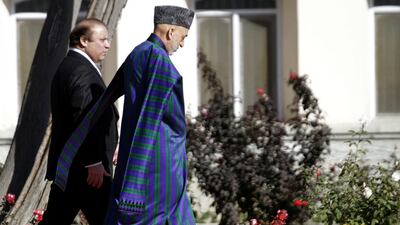After assuming office Afghan president Ashraf Ghani adopted a very clear position from the very outset. Unlike his predecessor, Hamid Karzai, he wanted close ties with Pakistan and sought Islamabad’s help in negotiating with the Taliban.
Fortunately, Mr Ghani’s assumption of office came at a stage when Pakistan seemed to have taken a position that all enemies of the state, including those working on destabilising Afghanistan, were to be eliminated.
There seemed to be no impediment that the two countries could not remove in their efforts to improve relations. Gen Sher Mohammad Karimi, the Afghan army chief was given the honour of being invited to preside over the passing out of cadets from the military academy this year.
What is more, the US, China and Russia all seemed supportive. China’s Strategic Commercial Corridor was widened to include Afghanistan and there really seemed no cause for concern.
And yet, during Mr Ghani’s visit to New Delhi last month, it seemed that he was not happy with the extent of Pakistan’s cooperation. Was that feeling genuine or a figment of the Indian media’s imagination?
As I wrote in a previous article, a spring offensive by the Taliban was to be expected and Mr Ghani was rightly concerned with the pressure building up from the threat of ISIL. Mr Ghani's representatives, with Pakistani assistance, are trying to reach out to the Taliban, but no substantial progress has been made.
Is this due to the Pakistani army’s duplicity, as Indian media implies?
The real problem is the Kunduz offensive. Kunduz, a province next to Tajikistan in northern Afghanistan, is under attack by the Taliban. While a surge in Taliban activity in southern Afghanistan around Kandahar was expected, and might not have caused so much concern, the Kunduz action was unexpected and it poses a threat to China as well. Thus Mr Ghani’s great concern.
But then the last thing that Islamabad would want is to permit, even by silence, something that causes concern to China.
So what is going on?
The fact of the matter is simple: the Afghan Taliban have splintered. Mullah Mohammed Omar, the Afghan Taliban leader, is from the Ghilzai tribe, but the Taliban stronghold is the area around Kandahar, where the Durrani tribe dominates.
The Durranis claim descent from Ahmed Shah Durrani, the 18th century king who founded modern Afghanistan and, therefore, they claim superiority over other tribes. The Popalzai sub-tribe of the Durranis claim closest descent, and Mr Omar’s long-term number two, Mullah Abdul Ghani Baradar, who was captured in 2010, is from that group.
While the bulk of Afghan Taliban are either Ghilzais or Durranis, and Mullah Omar is their accepted leader, it was Mullah Baradur who helped weld them together. With him out of the picture, Mullah Omar was weakened and the splintering began. Its first manifestation was the targeted killing of former Afghan president Burhanuddin Rabbani in 2011.
The second event that weakened Mullah Omar’s hold in the non-southern portion of Afghanistan was the US isolation of Jalaluddin Haqqani. Haqqani belongs to the Zadrun tribe, who dominate the region around Kabul.
I am astonished as to why the US wanted to isolate theirerstwhile ally, Mr Haqqani. He was a natural counter to Mullah Omar and, even after he reluctantly joined the Taliban, he was never fully committed to their ways.
Now that Mr Ghani wants to reach out to both Mullah Omar and Mr Haqqani, Pakistan is trying to facilitate talks with both. The problem is that neither of them has any sway over the splintered factions, and neither does Pakistan.
This is what has Mr Ghani worried. And, this also explains the Pakistani prime minister, Nawaz Sharif’s, strong statement in support of Kabul during his visit this month. Mr Sharif condemned the Taliban and said the continuation “of such attacks will be construed as terrorist acts, and we condemn such attacks in the strongest terms”.
Many queries arose as to whether this was a real volte-face by Pakistan. Was Mr Sharif also speaking for the army? Had Pakistan finally turned its back on the Afghan Taliban that it had once supported?
It was indeed a warning to the Taliban and a reassurance to Kabul that, I am certain, had the army’s support.
Pakistan is now unequivocally committed to supporting Mr Ghani, who has clearly refused to continue with Mr Karzai’s animosity towards Pakistan. This assertion is supported by the intelligence-sharing agreement signed between Pakistan’s ISI and the Afghan National Directorate of Security.
The Kunduz offensive is likely to fizzle out soon due to the joint efforts of Afghanistan, Pakistan and China. But it has brought to light many weaknesses of Kabul, the Taliban, Islamabad and US policies.
Brig Shaukat Qadir is a retired Pakistani infantry officer

